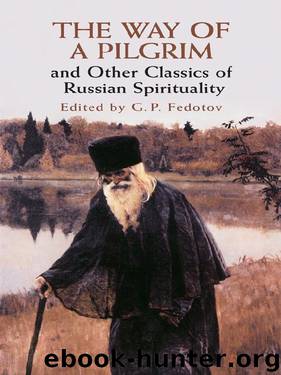The Way of a Pilgrim and Other Classics of Russian Spirituality (Dover Books on Western Philosophy) by Fedotov G. P

Author:Fedotov, G. P. [Fedotov, G. P.]
Language: eng
Format: epub
ISBN: 9780486147192
Publisher: Dover Publications
Published: 2012-08-15T17:00:00+00:00
All good deeds done unto the Lord,
And purity of virgin souls.
“The Holy Spirit itself enters our souls, and this entrance into our souls of Him, the Almighty, and this presence with our spirit of the Triune Majesty is only granted to us through our own assiduous acquisition of the Holy Spirit, which prepares in our soul and body a throne for the all-creative presence of God with our spirit according to His irrevocable word.”
There is the man and the message, and it would be difficult to assert that either was typical of the Russian mind through its century and a half of secular humanism since the days of Catherine II. He was afflicted neither by psychological revolt nor by discursive introspection; but there was in him an uncommon zeal for godliness and holiness, and a great love for the simple man. The self-conscious members of the intelligentsia could not have appreciated him, even had they heard of him. When they did hear, when Seraphim was canonised in 1903, this solemn act was dismissed and condemned as a mere “canonisation of peasant ignorance” at the instance of the statesman Pobedonostsev in the interests of poltical reaction. Not until a new movement had matured in the “return of the intelligentsia” to the Orthodox Church was the elder seen at anything like his full stature. And then in the hour of political and social ruin they found that Seraphim could speak to them on the very subject that had vexed the intellectuals for generations—God in the world and the meaning of the world for God which is the whole destiny of man.
The tribute that has since been paid to Seraphim has been wholehearted, for Seraphim has justified Russian Christians to themselves in the hour of secular judgment. Naturally enough it has been a human and personal vindication. Professor Lossky contrasts Seraphim with the medieval St. Sergius and the period when the Russian Church exercised a creative influence in Russian social organisation. “Seraphim of Sarov,” he says, “is the inexhaustible source of a warm and intimate caress in the individual relationships of men.” Professor Ilyin sees in the elder a revelation of some secret concerning the maturing of the individuality in time. “Individuality is apophatic,8 closed; it is the ‘non-ego’ and bears in itself the seal of God the Father, the Lord of Hosts, the Absolute Individuality.” These are vast phrases, but the theme is great, greater even than the collapse of liberal individualism. For the elder was no individualist, as he also was no subjectivist. His sense of human social relations also was creative. He was a churchman and a monk in his community at Sarov; but his great creation in this sphere was his organisation of the social and mystical life of the community at the Diveyev Convent, which gladdened the sensitive mind of Nicholas Fedorov as he pondered over his hopes for an active social participation in the “common task” of the resurrection.9 Fairest of all perhaps is the appreciation of Fr.
Download
This site does not store any files on its server. We only index and link to content provided by other sites. Please contact the content providers to delete copyright contents if any and email us, we'll remove relevant links or contents immediately.
The remains of the day by Kazuo Ishiguro(7551)
Tools of Titans by Timothy Ferriss(6947)
The Black Swan by Nassim Nicholas Taleb(6192)
Inner Engineering: A Yogi's Guide to Joy by Sadhguru(5897)
Giovanni's Room by James Baldwin(5878)
The Way of Zen by Alan W. Watts(5800)
The Six Wives Of Henry VIII (WOMEN IN HISTORY) by Fraser Antonia(4791)
The Power of Now: A Guide to Spiritual Enlightenment by Eckhart Tolle(4755)
Astrophysics for People in a Hurry by Neil DeGrasse Tyson(4620)
Asking the Right Questions: A Guide to Critical Thinking by M. Neil Browne & Stuart M. Keeley(4576)
12 Rules for Life by Jordan B. Peterson(3734)
The Ethical Slut by Janet W. Hardy(3503)
Skin in the Game by Nassim Nicholas Taleb(3460)
Housekeeping by Marilynne Robinson(3401)
The Art of Happiness by The Dalai Lama(3384)
Double Down (Diary of a Wimpy Kid Book 11) by Jeff Kinney(3272)
Skin in the Game: Hidden Asymmetries in Daily Life by Nassim Nicholas Taleb(3264)
Walking by Henry David Thoreau(3234)
12 Rules for Life: An Antidote to Chaos by Jordan B. Peterson(3203)
